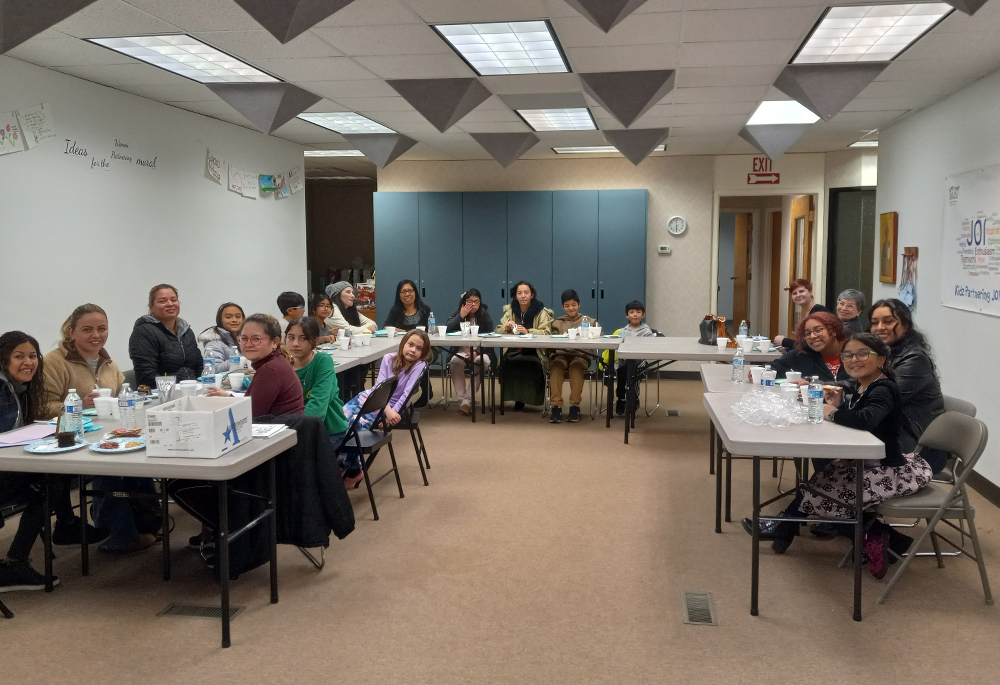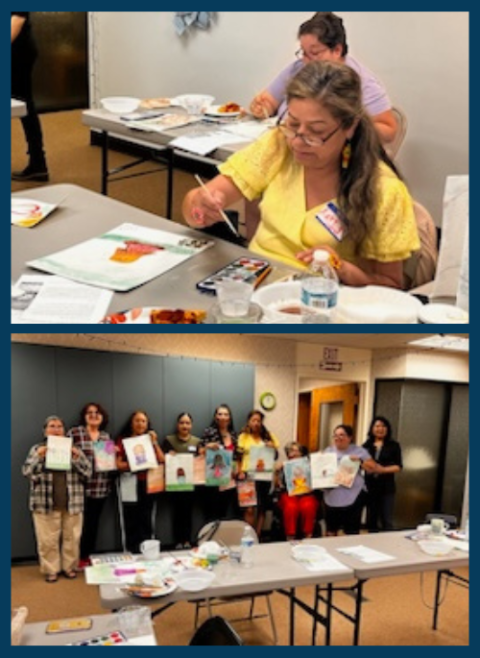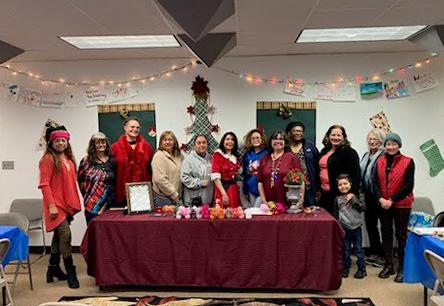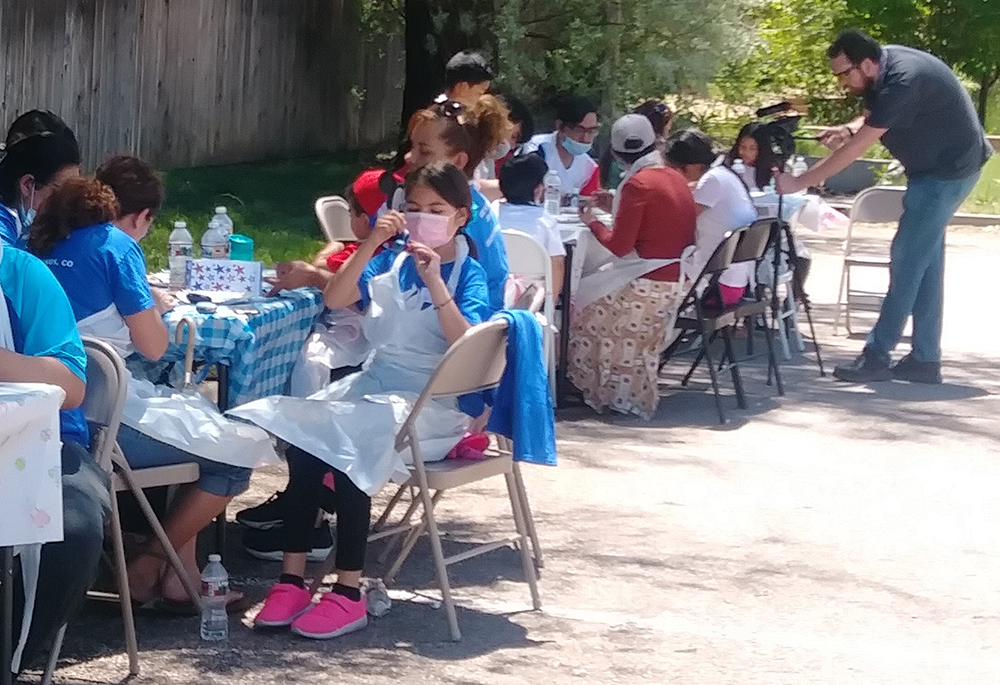
Clients of Women Partnering and their families participate in a holiday activity at the nonprofit. Women Partnering provides financially vulnerable women with the tools and support to achieve economic sustainability and overall independence. (Courtesy of Women Partnering)
During the years Sr. Frances Sedlacek ministered in rural areas of Brazil, she witnessed a movement that shifted her worldview.
"The women in Brazil were like slaves. They had no rights, no say in anything, but they started fighting [for equality]. They said, 'We want a voice in our villages and in decisions being made,' " recalled Sedlacek, 75, a member of the Sisters of St. Francis of Perpetual Adoration. "[I had the] experience of watching these women finding a voice."
She craved to empower women this way in her hometown of Colorado Springs, Colorado. And when she returned in 1998, she found two fellow sisters of St. Francis passionate about the same idea. These included Sr. Jeannette Kneifel, who had just authored a Ph.D. thesis on energizing women to take action in their lives, and Sr. Marilyn Uhing, who had launched a women-centered spiritual organization.
"We were alive with the idea of women helping women to have a voice in their own life," Sedlacek said. "We got together and decided to develop a new program."
The sisters accomplished more than she ever imagined with the nonprofit they created together, Women Partnering. Serving the Colorado Springs area, this organization provides financially vulnerable women with the tools and support to achieve economic sustainability and overall independence.
With services provided at no cost to women, the nonprofit has helped over 5,400 women and 5,000 children since its opening in 2001.
"We've had many women go through [our programs] and completely turn their lives around," said Sedlacek, now vice president of Women Partnering's board.
Women speaking for themselves
Women have served as the nonprofit's driving force since its planning stages in 1998.
Seeking the expertise of women actually experiencing social and economic challenges, the three sisters initially assembled a research team of five women in financial straits who also "had the wherewithal to speak for themselves," Sedlacek said.
The sisters worked closely with this group, applying their lived experiences to identifying unmet needs for local women and brainstorming how a new organization might address these.
'We've had many women go through [our programs] and completely turn their lives around.'
—Sr. Frances Sedlacek
"Even though they were on welfare and struggling to make ends meet, those five women were outstanding," Sedlacek said. "They were very outspoken."
In the spirit of giving women a voice, the sisters encouraged this team of women to present a proposal to their provincial chapter of the Sisters of St. Francis. This successfully secured a vote to establish a $1 million foundation to create Women Partnering.
"[The local women] spoke at that meeting in front of our sisters, and they did an outstanding job," Sedlacek said. "They were so involved in wanting this."
Tackling urgent needs
Since then, Women Partnering has constantly evolved, currently operating in an office provided at no cost by health care network CommonSpirit Health.
At first, simply inviting women in need to connect with them, the sisters developed what has become central to the nonprofit's services: individual development plans that identify each woman's specific needs, focused primarily on financial, medical, housing, mental and education issues.
"[This plan] helps women establish their goals and identify what's the most urgent need right now, whether it's not to get evicted or not have their electricity turned off," said Sedlacek, noting that Kneifel largely spearheaded the organization's operations for years, and has since retired due to health issues. "Then we help them get on their feet enough to keep coming back."

In the top image, Women Partnering clients paint at an art class provided by the nonprofit; below, clients present vision boards depicting long-term goals. (Courtesy of Women Partnering)
Women Partnering aids each woman by tapping into the group's vast network of contacts with numerous agencies and charities, she added, connecting women with essential resources.
After tackling women's most immediate issues, the nonprofit's team works directly with them to address the additional goals in their individual plans, one by one, to eventually attain economic sustainability.
"We don't give handouts, but we do direct them to the best resources we can," Sedlacek said.
Their efforts include helping women find shelter, connecting them with discounted medical services, providing stipends for counseling, funding bus fare for clients without cars, and even training women on booking doctor appointments, writing resumes and applying for utility assistance.
"It's all holistic, affecting all aspects of their lives," Sedlacek said. "Our basic [goal] is to help them have a voice, to help them speak and live in a manner that they could be economically sustainable."
The nonprofit sees a high level of need in Colorado Springs, Sedlacek notes. Their clients span a wide spectrum of races, nationalities and age groups, including single mothers, immigrants and even professionals with graduate degrees who "have fallen through the cracks" after experiencing circumstances that leave them destitute or homeless, she said.
Advertisement
"Right now, the biggest needs [among clients] are housing, domestic violence and [access to] health care," Sedlacek said, adding that the city police regularly contact the nonprofit about women in a crisis and women just out of prison who need the organization's help. "We've had such an impact on many women from all walks of life."
The issues they witness remain prevalent. The National Low Income Housing Coalition reports a statewide shortage of 119,792 affordable and accessible rental homes in Colorado for extremely low-income renters. And the police receive 35 domestic violence calls daily in Colorado Springs, according to the TESSA organization that supports domestic violence survivors in the city.
Women Partnering's programs have grown largely by word of mouth, Sedlacek said.
"Women would tell other women," she said. "It was first based on a network, and it still is."
Teaching life skills
Women Partnering also helps clients develop crucial life skills through its Drop-In and enrichment programs that Uhing developed.
"The whole theme is living well in mind, body and spirit," said Uhing, 87, who holds a master's degree in social work and hails from an extensive social services career.
The Drop-In program offers educational presentations twice a month on a wide variety of topics, including budgeting, nutrition, conflict resolution and addressing abusive situations.

Women Partnering hosts a holiday event for clients. (Courtesy of Women Partnering)
"The whole program is based on what the women need," Uhing said, adding that clients suggest the topics.
The nonprofit's enrichment programs present special speakers from across the community who discuss their specialties and various available resources.
"The purpose is to present information that will enhance [clients'] knowledge, spirituality and self-esteem, and then provide a connection between providers and the women being served," Uhing said.
Not only do participants report improvements in their relationships, health and quality of life, Uhing said, but they also bond with other attendees.
"The women get to know each other and get to support each other," she said.
Helping women transform
With 650 women served in 2023 alone, Women Partnering impacts numerous women with just a handful of staff members and volunteers, said Jennifer Taylor, executive director.
"Everybody believes in the mission," she said. "They see the need, and they see how we're able to help people."
Many clients stand out in her mind, especially one who had survived human trafficking. Women Partnering paid for a hotel room for her and her children, Taylor said, until she entered a special support program. The nonprofit also covered her Uber rides to obtain a job, invited her family to the nonprofit's holiday programs and connected them with a ministry to provide her children with stylish attire for prom.
"Now, she has housing and is working full-time," Taylor said. "That's what keeps us doing our job, just seeing her transformation."
Women Partnering's spring newsletter highlighted additional client stories, including a single mother whose partner had left her and took all their savings. Women Partnering provided her with partial rent assistance and a loan, allowing her to avoid eviction and find a job. The nonprofit also connected her with community resources to support her son with a disability.
The newsletter also detailed how the nonprofit helped a survivor of domestic violence find safe housing while awaiting a background check to enter a shelter and also provided a hotel voucher for a partially blind mother of two who couldn't stay in a shelter due to the unique needs for her children on the autism spectrum.
"It's really exciting to see [clients] come in who are just so disheartened, and they feel supported and heard [by our team], and then you're able to give them the tools, and they flourish," Taylor said.

Youths paint rocks as an activity with the KidZ Partnering Junior Optimist International Club, created by Women Partnering, to benefit the children of the nonprofit's clients. (Courtesy of Women Partnering)
An outlet for children
To enrich the lives of clients' children, Women Partnering founded a KidZ Partnering Junior Optimist International, or JOI, Club in 2013 for school-aged youths.
The weekend club offers clients' youths the opportunity to plan and perform wide-ranging community service projects, Sedlacek said, as well as engage in educational projects and give group presentations.
"Some would give presentations at [agencies] where we could look for help," she said. "It's all about giving back and learning to be leaders."
Women Partnering also takes JOI Club participants on excursions throughout the year, introducing them to activities such as rock climbing, treasure hunts and attending sports games.
"All these things give them exposure and experience and understanding of things they wouldn't be able to do on their own because their parents couldn't afford it," Sedlacek said.
The whole community benefits when clients and their children obtain housing and economic stability, Uhing said.
"We are grateful that God has given us the strength and energy to do this," she said. "It's been a privilege to live out the Gospel this way."







